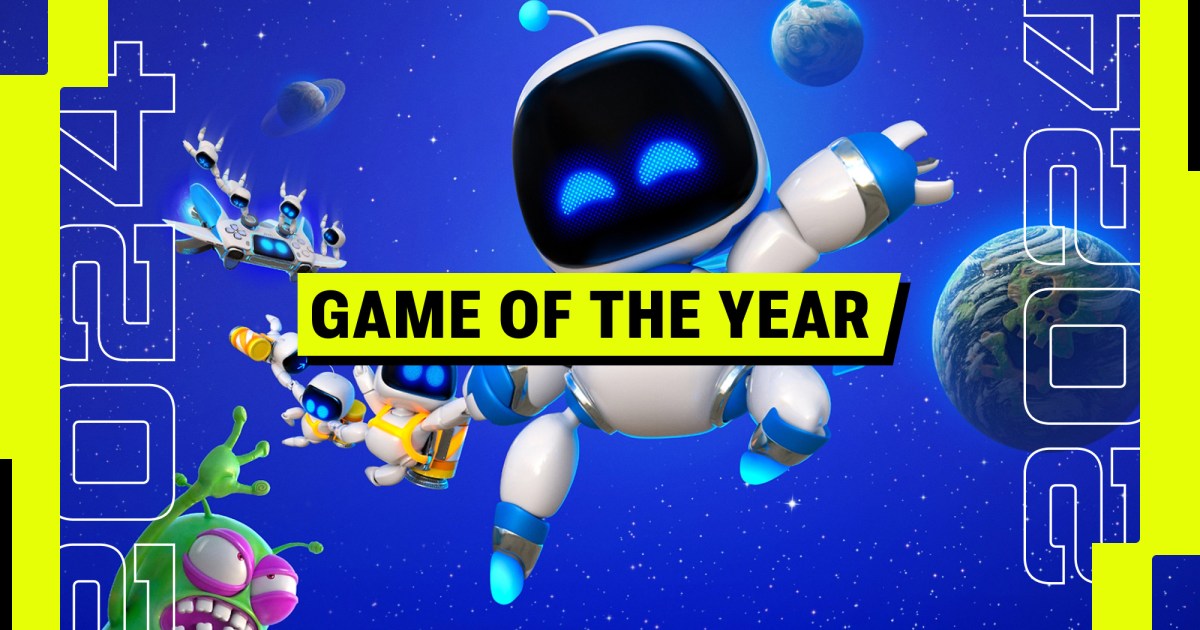The process of picking one “game of the year” is a journey marked by second-guessing. Not a December goes by at Digital Trends where we aren’t agonizing over our annual top 10 list. Do we actually love Baldur’s Gate 3 as much as we think or are we giving in to the pressures of critical consensus? Is Elden Ring a lame year-end pick when we could be celebrating something like Immortality that still sticks with us years later? Are we weighing independent games enough in our deliberations? These are the kind of questions that keep us up at night as winter begins.
This year, we were faced with a similar mental puzzle. After 12 months of obsessively tracking our GOTY front-runners in detailed spreadsheets, one game was left standing: Astro Bot. The delightful platformer had won our hearts thanks to its precise platforming, good-natured attitude, and toylike design. It seemed like a no-brainer, but it was still hard to combat that lingering doubt as one question still haunted us.
Is Astro Bot a “soft pick”?
It’s a phrase that I couldn’t shake during deliberations, as I perhaps preemptively hearing the voices of critics in my head. After all, Astro Bot is the most pound-for-pound “fun” game of the year, but one could argue that it’s a pure toy that doesn’t have much to say. Perhaps our top pick should have gone to something that reflects back on the real world like 1000xResist or Dungeons of Hinterberg. If we were honoring a work of total entertainment this year, why not honor something wholly original like Balatro or UFO 50? Even next to other big-budget games, does Astro Bot’s playful level design stack up to the gargantuan grief poem of Final Fantasy VII Rebirth or Metaphor ReFantazio’s grand exploration of democracy?
This is the inherent folly of crowing one game the best in a year. More than any other medium, video games are splintered when it comes to what they set out to accomplish. Some are pure entertainment. Others are works of art that use interactivity to express ideas. Then there are your live-service games that are more about curating lifestyles for players, as well as gacha games that have more in common with casinos than art. Those differences sparked ugly tirades throughout 2024, as players clashed over philosophies of what the function of a game really is.
Of course, there is no singular answer to that question — and that’s the beauty of games. Sometimes a video game is an RPG that explores a character’s queer identity through the lens of fantasy. Other times, it’s gunning down waves of Tyranids and forgetting all about it 10 minutes after powering down your PlayStation. Both of those experiences aren’t just valid; they’re connected. The one thing that unites just about every video game, no matter how far apart they are in their intent, is curiosity. The joy of turning on a game always comes back to the medium’s inherent playfulness. It’s that magic moment where the screen first lights up and you see a new world for the first time. That’s the enduring power of Super Mario Bros., a game whose eternal charm comes from the simple magic trick of pressing the A button and watching Mario jump onscreen.

It’s with that in mind that I come back to Astro Bot, the simple little platformer that so easily won players over back in September. There’s no gimmick or innovation that makes it special; it’s simply the tightest 3D platformer of the past decade. Its movement is elegant enough to support a heated speedrun mode, its levels are intricate toys that reward players who stop to prod every corner, and it features a wealth of nostalgic callbacks to PlayStation history. It’s an archetypal genre game powered by good-natured fun and a wealth of collectibles. So what’s the big deal?
It’s hard to convey an answer in words, but you’ll likely feel it the first moment you thumb the Dualsense joystick forward. There is a magic in Astro Bot that is so easy to take for granted in a modern landscape flooded with games. It’s too easy to become numb to the joys of interactivity, as you yawn through a spectacular Black Myth: Wukong boss fight. Throughout the year, I heard hollow slang like “slop” or “mid” liberally thrown around to describe painstakingly crafted works of interactive media. I’m sure I used them myself to write off Stellar Blade or Concord in casual conversation.
That brand of unaffected cynicism never crossed my mind during my 15 blissful hours with Astro Bot. I played each of its lovingly designed platforming levels with a smile plastered across my face, and experienced the kind of wide-eyed joy I haven’t felt since playing Crash Bandicoot for the first time as a kid. I was eager to toy around with each new power-up, blasting through a tower of cans with my bulldog rocket pack just to hear them all scatter just as I’d so curiously tested the nuance of Super Mario Bros. 3’s frog suit growing up. Each button tap felt like a small miracle, the kind I now take for granted daily.
Astro Bot taps into something primal.
It was only once I ended my playthrough and returned to the real world that I began doubting my gut reaction. The few weeks after Astro Bot’s release launched a debate about its role as a Sony product, full of character cameos from now-dead franchises that only exist to prop up the PlayStation brand. How were these cute little references any different from gaudy Funko Pops built to monetize fandom? These were fair cultural critiques, ones that kept nagging at me as our team landed on Astro Bot as our Game of the Year. Had we been too easily duped by a game built to toy with our serotonin through easy nostalgia?
Again, none of these existential questions matter the second I pick up that controller again. When I am playing Astro Bot, I’m fully lost inside its charming world. I’m not playing its excellent Ape Escape level and thinking about IP. I am a kid again who has fully let my sense of curiosity take the reins. The world of Astro is warm and inviting, whereas the real world is so often cold and clinical. Each play session transports me back to a different space where I gleefully played games as a kid, free from the curse of the internet and its ceaseless discourse. I’m in the back room of my grandparents’ summer home playing Spyro the Dragon. I’m in my childhood friend’s basement playing Super Mario All-Stars. I’m in my own house playing Pikmin on Christmas Day. These are the places where I still believed video games were miracles.
Astro Bot taps into something primal. In a time where big-budget video games keep getting larger and more complex, it jumps back into gaming’s primordial soup. There, it rediscovers that simple joy of a medium so overburdened by the impossible demands of profit, infinite unsustainable tech ambition, and constant rage from those who like complaining about games more than playing them: press a button, make a guy jump.
Sometimes it’s as simple as that.
Read the full article here














